Daily Journal
September 18–19, 2004:
Weekend Edition
After our first week at sea we thought we would like to share some of the
things we've learned about living at sea on a bobbing ship. We also want
to give a special salute to the crew who runs this ship.
Salute to the Crew
Many of the crew who work on this ship have a very different lifestyle
than we do. Sometimes they are away from family and loved ones for months
at a time. The living quarters are confining and there is no place "to go"
after they get off work. The work itself can be very difficult on a
constantly moving ship. The highlights of the day are the delicious meals
prepared by the ship's cooks. Dining onboard is like eating in a four-star
restaurant. For rest and relaxation the crew might watch movies, read, or
watch the sunsets off the deck. Their cameraderie is very evident. They
care for and about each other. They are like a "family" unto themselves
out here on the high seas.
The Galley and Cooking at Sea
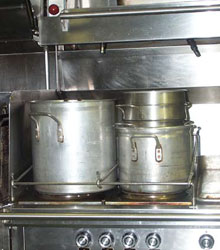 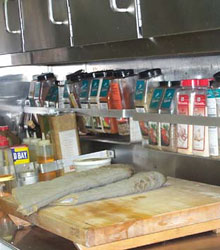
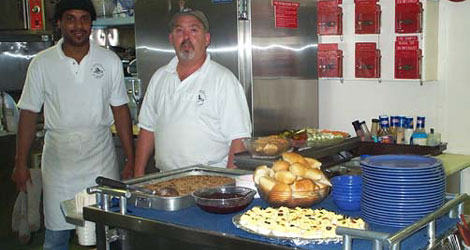
Above: Doug and Aaron have prepared a Thanksgiving feast.
The food on board ship always has something for everyone, no matter what
their dietary needs or preferences. As you can imagine, planning three
meals a day for 14 or more days up to several months is a huge
undertaking. There are menus to plan, food to inventory, food to order
ahead of time, and food to order fresh. While in port, the cooks have to
stock up their larder. Sometimes they must restock while visiting foreign
ports where ordering and purchasing provisions can be difficult. Imagine if you had to purchase fresh produce and make it last for 30 days. Next you must purchase 30-50 gallons of ultra-pasteurized milk.
Other vegetables, meat, bread, cereals must be on board before leaving
port because their are no grocery stores at sea. The cooks are also
responsible for cleaning supplies aboard the ship. They also have an extra
supply of food to share with another ship if there were an emergency at
sea.
Once all food is on board, the real fun begins. Cooking on board a moving
ship is most challenging. The rocking forward and back and side to side
requires the cooks to be agile, quick moving and creative. Pots are
secured on the stove top with a metal frame. Food being served is in
wells or secured by special shelves with a non-skid covering.
Doug, the cook, said he once cooked an entire Thanksgiving dinner. The
only thing he couldn't prepare was a homemade pumpkin pie because the
liquid filling would spill over because of the ship's motion.
Bonus Question:
What are the two provisions you must never be without while at sea?
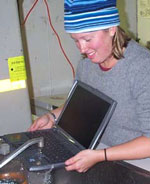 Amanda Washing her Laptop Amanda Washing her Laptop
Life aboard ship can be hazardous for electronic equipment. A rogue wave
can attack computers mercilessly, as Amanda found out on the aft deck
while collecting data from the HyperTSRB. She is shown here washing her laptop with fresh water to get the salt water out. She is hoping it will still be alive after drying it with a hair dryer.
Laundry on Board
There are two washers and dryers on board. The crew and scientists use
them on alternating days for personal laundry. They are located in the
belly of the beast, i.e. in the bow.
Here is a Math Problem:
On Saturday there were 13 scientists who needed to do their laundry. The
washer takes 25 minutes and the dryer usually takes 60 minutes to dry a
load of clothes. If all the scientists decide to wash their clothes on the
same day, how long will it take for everyone to wash and dry their
clothes?
Answer to the Bonus Question:
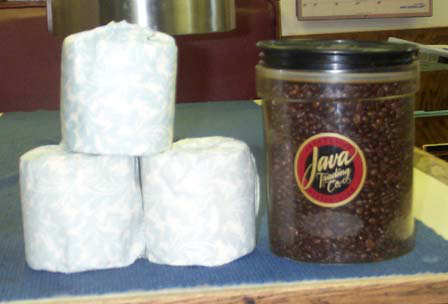
Back to Daily Journals

|







